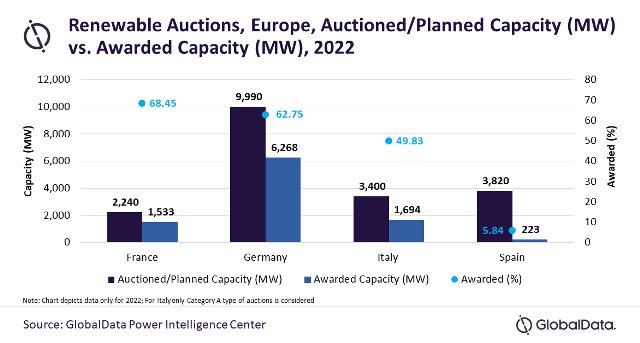The renewable energy auction market in Europe is witnessing two opposing trends, according to a report from GlobalData.
The offshore wind sector is experiencing intense competition, resulting in subsidy-free bids across major countries. However, renewable power auctions have been undersubscribed in the past year due to various factors such as increased raw material costs, rising logistics expenses, higher interest rates, and prolonged approval procedures.
Zero-subsidy bids are gaining traction in the market. For instance, RWE won a zero-subsidy tender for the 1GW thor offshore wind project in Denmark in December 2021.
A similar trend was witnessed in Germany, where a 658MW project in the North Sea and a 300MW site in the Baltic Sea both closed at zero-subsidy bids. In September 2022, RWE won a 980MW project in the North Sea with a zero-subsidy bid. This trend indicates that advancements in technology and reduced production costs have enabled offshore wind power plants to let go of government subsidies confidently.
However, in 2021, not a single bid was received for the technology-neutral tender in June, according to the Danish Energy Agency (DEA). A similar scenario was observed in other major European nations in 2022. The year was underwhelming for German solar PV auctions, with both ground-mounted and rooftop auctions underperforming.
Italy conducted ten rounds of renewable energy auctions for Category A, but only the first auction’s planned capacity was fully allocated. Between 2019 and 2022, a total of 7.3GW planned auctions were conducted, of which only 3.9GW of projects were awarded, slightly over half of the capacity offered.
Spain introduced updated auctions in 2021, which initially received a tremendous response, with both auctions conducted that year being oversubscribed. However, in 2022, the two rounds of auctions were a failure, with only 223MW capacity awarded against the auctioned capacity of 3,820MW.
Similarly, the French auction program underperformed between 2018 and 2022 due to the low ceiling price set by the government and additional scrutiny of bid applications. However, the last solar PV self-consumption round conducted in 2022 received an overwhelming response, with the awarded capacity exceeding the auctioned capacity, which is a positive sign for the French renewable auctions in 2023.
Developers across Europe face several challenges in the renewable energy auction market, including rising inflation, supply chain constraints, high raw material costs, and an increase in logistics expenses. They find it challenging to obtain approvals from government authorities due to lengthy bureaucratic procedures, which discourage investments. As per the EU’s renewable energy directive, member states are required to grant permits for new greenfield wind projects within two years, but this has not been the case. For instance, it takes approximately five years to obtain a permit for an onshore wind project in Italy.
The low ceiling price of auctions has also been a significant issue. Developers are unable to bid at a lower price due to the rising cost of equipment and components across the value chain. Therefore, the European governments should increase support by raising the ceiling price and reducing the time for approval processes. They may also consider schemes such as the contracts for difference, which will reduce the burden on the government by paying only the differential price and benefit the developers by protecting them from fluctuating energy costs.

